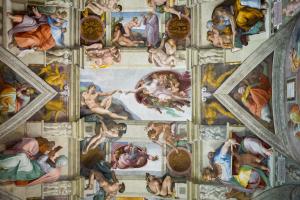
Because Scripture says humanity is made in the image and likeness of God (cf. Gen. 1:27), many upon reading that statement misinterpret it as indicating that only humanity can be said to be made in the image and likeness of God. This is a bad reading of the text, because it doesn’t say only humanity is made in this manner. If I said something similar, such as a particular artist made a painting in their own image, this would not mean it is the only painting they have done in this fashion – artists often make many self-portraits throughout their career. On the other hand, we should not take this statement as being unimportant. It was stated for many, purposes, among which, to reaffirm the dignity of human nature.
God is not only infinite, but unbounded in such a way that no created thing can truly be compared to God as if they were equals. God is both an unbounded infinity and simple, a paradox which is difficult for us to grasp because we, are bounded beings composts of parts (and so can be said to be “complex”). God is eternal, and without a beginning, while we have a beginning, These and other differences make it impossible for us to truly compare ourselves to God. But, on the other hand, we are said to be made in the image and likeness of God, which implies there must be a way in which God can be reflected in and through us, and so a way which we (and others) can represent God. When we do so, we must understand, the comparison is not in a univocal sense, but rather, in an analogical sense. That is, the categories which we use to make the comparison are analogical, so that there is something different about it when it is found in and with God. Having Scripture tell us that we are made in the image and likeness of God should encourage us to look for what is great in us and consider that as a way to look up to and apprehend God, realizing, of course, even that analogy will only point the way to apprehend God and will fail if we absolutize it. That is because it would limit God in accordance to the way the category being employed applies to us. Once that is understood, what we use to discern God’s image and likeness in us can then be embraced by us in such a way as to make it greater in us, and when we do so, it can be said we become more like God, even though God’s nature infinitely transcends us and will not be comprehended by us.
What is true for us, is also true for the rest of creation. All things point to and reveal God in their own way, and so in and through all things, we can find our way to God. Most of us, indeed, learn about God through such reflection. We can and do learn about God in other ways as well, such as through the learned reflections of others, revelation, and all the reflection which emerges from revelation. But, it is important, even with those other ways of encountering God, we still end up apprehending something about God in and through all creation, and this is because there is some reflection, however derivative it is, of God in all things. Henry of Ghent, for example, pointed this out by looking at agency and how it can be said that every agent, every actor, posits something of themselves in the effects the produce:
Since, according to the Philosopher, every agent, however contrary, acts for an end, insofar as the agent is something similar, but since an agent, insofar as it is something similar, produces something similar, and since every agent also acts through its form and produces an effect in some formal being, it is necessary, therefore, that in all such things there is always in the product and effect a likeness of the form of the agent. [1]
This, Henry says, allows us to find something analogous to God in all created things:
And, therefore, since God is the efficient cause of all creatures, although of some creatures by means of other causes, of which he is the first and most remote principle in this respect, every creature necessarily has an agreement with God in terms of some form, at least in terms of an imitation of form by form. [2]
William of Auvergne, following along with such reasoning, also suggested that because God is a Trinity, there will be something in everything which can also point to and suggest the truth of the Trinity:
First, we shall try to search out how the most blessed Trinity is reflected in individual things and how each and every thing is a kind of shadow or likeness of it and even its footprint and back, as Scripture says. Indeed God himself talking to Moses said, “My backs you will see, but you will not see my face, because no man sees me and lives” [Ex. 30:20, 23]. Of these backs we shall first consider the last. These are sensible things. I mean that int all sensible things we find a certain variety and clothing about with natural accidents. This variety and clothing is a certain facet of the sensible thing, but an exterior facet by which each sensible [thing] makes itself known to the senses. Hence, [this variety] is like its exterior word by which [the thing] speaks itself to the senses. I call it an exterior word because it is not just of itself an image of its essence. Hence, it is like a spoken word since it is not a sign of likeness, but perhaps a sign of relation or comparison.[3]
It is for this reason, even if Henry of Ghent is reluctant to do so, we can say that the image and likeness of God is in all things. Each thing will possess that image in a different manner, each in accordance to the potentiality given to it by God. This is one reason why we should care about creation and protect it, for by doing so, we show respect to the image and likeness of God, and through that respect to God’s image, to God as well.
While natural theology, reflecting upon God through nature, is an important step for us, we must not let it be our last step. That is, we should be open to revelation and use it with reason and what we discern through natural theology to attain our being understanding of God. Indeed, revelation will often correct misunderstandings which can emerge through natural theology, for natural theology is limited to what our reason and understanding can advance, and so, it will only offer a limited presentation of God which, if we absolutize, ends up becoming an idol. Once we have accepted such limitations for what we can get from natural theology, we should engage it and learn from it all that we can, using it not only to better apprehend God, but to also see how and why we should not ignore creation and its value. We should do what we can to preserve God’s image in creation. We should feel sorrow when some image of God, some element of creation is entirely wiped out of existence. Every such destruction leaves us impoverished, as we will have less of God’s glory reflected in creation. With that absence, all things will be worse off. This is why those who decry the world, fearing that those who would protect the world from human abuse are idolatrous, are in reality ignoring and devaluing God; they go too far in their negation of the world and end up, in this way, not only denying the presence of God in the world, but the value of religion as well:
Just as time is (according to Plato) “the moving image of eternity which is at rest,” so the moving, changing, unilluminated, inwardly antagonistic, motley, manifold diversity of the world is also a harmonious unity, an illuminated order. In this sense the world is a “reflection” of God’s glory; and the ancient world-view that considers the world to be a cosmos, a divine being, is completely legitimate insofar as it does not eliminate our awareness of the true God who is wholly other than the world. In spite of all the opposition between God and the world, the world in some sense (precisely in the eminently transrational sense) bears an essential likeness to God. And all total rejection of the world as completely evil, all rejection of its divine roots and therefore its “likeness” to God, leads in the final analysis to the loss of the religious consciousness and blindness in relation to the supra-existent reality of God – which was already made clear in our foregoing discussion of absolute dualism (see Chapter VIII, 1.3).[4]
Thus, to affirm God, and religious consciousness, we must affirm the world, not reject it. We must affirm the image and likeness of God in all creation, recognizing God’s presence can and will be made known by it. Indeed, we should do what we can to let that image and likeness shine forth, which means, we must help purify the world, cleansing it from the damage to it by human sin. On the other hand, it is always important to remember that the image and likeness of God, as it is found in the world, only serves as an analogous, not a univocal, representation of God, so that we must not become so attached to the way God can be apprehended in the world we cut ourselves off from the transcendent glory of God. Both mistakes must be avoided, but of the two, the urge to deny God’s presence in the world, God’s image in creation, is the worst, because it ends up being nihilistic, denying the goodness God granted the world.
[1] Henry of Ghent, Henry of Ghent’s Summa: The Question on God’s Existence and Essence (Articles 21 – 24). Trans. Jos Decorte and Roland J Teske, SJ (Leuven: Peeters, 2005), 51 [Art 21 Q2].
[2] Henry of Ghent, Henry of Ghent’s Summa: The Question on God’s Existence and Essence (Articles 21 – 24), 51 [Art 21 Q2].
[3] William of Auvergne, The Trinity, Or The First Principles. Trans. Roland J. Teske, SJ and Francis C. Wade, SJ (Milwaukee: Marquette University Press, 1989), 160.
[4] S. L. Frank, The Unknowable: An Ontological Introduction To The Philosophy of Religion. Trans. Boris Jakim (Brooklyn, NY: Angelico Press, 2020), 272.
Stay in touch! Like A Little Bit of Nothing on Facebook.
If you liked what you read, please consider sharing it with your friends and family!
N.B.: While I read comments to moderate them, I rarely respond to them. If I don’t respond to your comment directly, don’t assume I am unthankful for it. I appreciate it. But I want readers to feel free to ask questions, and hopefully, dialogue with each other. I have shared what I wanted to say, though some responses will get a brief reply by me, or, if I find it interesting and something I can engage fully, as the foundation for another post. I have had many posts inspired or improved upon thanks to my readers.
















